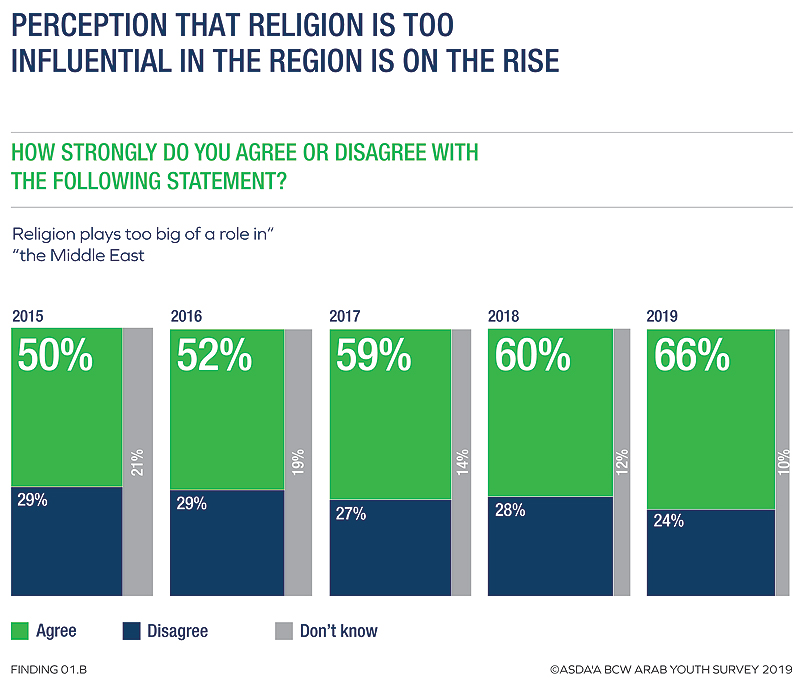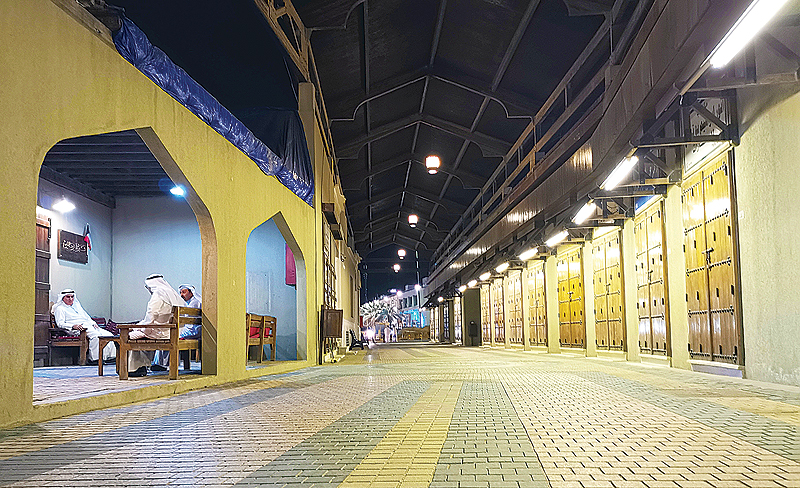Findings from the region's largest independent study of its kind

DUBAI: Young Arabs say religion plays too big a role in the Middle East and believe that religious institutions should be reformed, according to findings from the 11th annual ASDA'A BCW Arab Youth Survey, released today. The survey findings are based on 3,300 face-to-face interviews conducted by PSB between January 6 and January 29, 2019 with young Arab nationals aged 18 to 24 in 15 states in the Middle East and North Africa, with a 50:50 male female split.
The survey, the largest independent study of its kind into the region's largest demographic, finds that two-in-three (66 percent) young Arabs say religion plays too big a role in the region - an increase of 16 percentage points since 2015 - while even more (79 percent) say the region needs to reform its religious institutions. This call for reform can likely be explained by the fact that half (50 percent) say the Arab world's religious values are holding the region back.
The 2019 Survey also reveals that young people across the Arab world want to see an end to regional conflicts, such as the Syrian civil war with 73 percent saying the conflict should end regardless, whether Bashar Al -Assad stays in power or not. Instead of the regional conflicts, the survey data suggest that young Arabs want their governments to focus more on the economic issues, namely jobs and rising cost of living, the two issues seen as the largest obstacles facing the region.

Economic matters
Young Arabs have high expectations for their governments to deliver on the economic matters, as 78 percent say it is their government's responsibility to provide jobs to all citizens; 78 percent say they expect energy subsidies; 60 percent say their government must provide housing to all; and one in three (33 percent) even say it is their government's duty to provide financial debt repayment to all citizens. In the eyes of many young Arabs, their governments are currently falling short of meeting their expectations as nearly two in three (65 percent) say their country is not doing enough to help young families (83 percent in the Levant, 74 percent in North Africa, and 39 percent in the Gulf Cooperation Council [GCC] countries).
"The Arab Youth Survey once again provides tremendous insight into the thoughts of young people living in one of the most complex regions in the world," said Donna Imperato, Global CEO, BCW (Burson Cohn & Wolfe). "The information surfaced by the study provides important context for business leaders and policy makers as they work to understand and connect with this next generation of leaders."
The 2019 survey also explores how young Arabs perceive other countries in the region and outside the Middle East. For the eighth year running, the United Arab Emirates is seen as the top country to live in and for other countries to emulate. More than nine in 10 (93 percent) young Arabs also say the UAE is an ally of their country. Nearly as many young Arabs view Egypt (84 percent) and Saudi Arabia (80 percent) as allies to their country. Meanwhile, a strong majority say the United States is an adversary (59 percent) rather than an ally (41 percent). In fact, the views of the US among Arab youth are nearly as polarizing as the views of Iran (67 percent adversary vs. 32 percent ally); and when asked whether US or Russia is a stronger ally of their country, young Arabs are just as likely to select Russia (37 percent) as the US (38 percent), with another 25 percent saying that neither of the two global powers are an ally.
Drug usage and mental health
For the first time in the history of the survey, Arab youth's attitudes towards such issues as drug usage and mental health were explored. More than half (57 percent) of young Arabs say that drug usage among young people in their country is on the rise, and 57 percent also say that drugs are easy to obtain in their country. The perceived rise of drug use among youth is particularly prevalent in the Levant (76 percent) and North Africa (59 percent).
When asked about mental health issues, a majority (54 percent) say accessing quality medical care for mental health issues is difficult in their country, for some likely made even more difficult by the fact that half (50 percent) of Arab youth say there is a stigma around seeking medical care for mental health issues, such as anxiety or depression. The survey reveals that mental health is not an issue on the margins, as nearly one in three (31 percent) say they know someone suffering from mental health issues.
"At BCW, we are committed to using data, insights and analysis to fulfil our purpose of moving people, providing new perspectives on issues that are important to all of us," said Donna Imperato, CEO, BCW. "The ASDA'A BCW Arab Youth Survey is a perfect example of putting this into practice. Over 11 years it has established itself as a valuable research project that provides business leaders and policymakers with powerful insights into a critical demographic."
"For 11 years, the survey has provided insights into the hopes, fears and aspirations of the region's youth," said Sunil John, President, ASDA'A BCW. "This year's finding show that youth are looking at their governments to reshuffle their priorities, especially when it comes to the role played by religion and seemingly endless conflicts - and they want to see change.
"Young Arabs who have grown up against a backdrop of extremism and geopolitical conflicts are tired of the region being defined by war and conflict," John continued. "They say they want their leaders to focus on the economy and providing better services such as quality education and healthcare, and respondents, particularly in North Africa and the Levant, expect their governments to do much more to address these core concerns."
With 65 percent of the Arab population under the age of 30, the survey presents evidence-based insights into the attitudes of Arab youth, providing public and private sector organizations with data and analysis to inform their decision-making and policy creation.
Other key findings from this year's Survey include:
- Three in four young Arabs are concerned about the quality of education in their country, and two in three say they would prefer to pursue higher education outside their country.
- Arab youth view Saudi Arabia and the US as the two nations increasing their influence in the region more than any other countries.
- Young Arabs are driving the region's e-commerce boom and are beginning to prefer paying by card rather than cash when shopping online.
- Among Arab youth, social media is more popular and seen as more trustworthy than traditional media.









